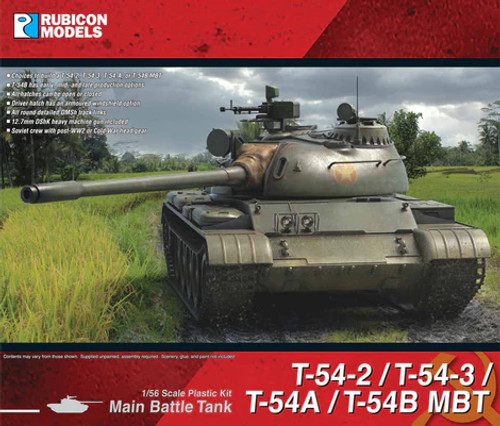Product Description
The T-54 and T-55 tanks are a series of Soviet main battle tanks introduced in the years following the Second World War. The first T-54 prototype was completed by the end of 1945. From the late 1950s, the T-54 eventually became the main tank for armoured units of the Soviet Army, armies of the Warsaw Pact countries, and many others. T-54s and T-55s have been involved in many of the world’s armed conflicts since their introduction in the second half of the 20th century.
The T-54/55 series is the most-produced tank in history. Estimated production numbers for the series range from 96,500 to 100,000. They were replaced by the T-62, T-64, T-72, T-80 and T-90 tanks in the Soviet and Russian armies, but remain in use by up to 50 other armies worldwide, some having received sophisticated retrofitting.
During the Cold War, Soviet tanks never directly faced their NATO adversaries in combat in Europe. However, the T-54/55’s first appearance in the West around the period of the 1950s spurred the United Kingdom to develop a new tank gun, the Royal Ordnance L7, and the United States to develop the M60 Patton.
Following the successful deployment of the T-54 as a main battle tank and with nuclear weapons as a threat, it was decided to create a basic NBC (nuclear, biological, and chemical) protection system for the T-54. The design was completed in 1956. To increase T-54 battle capabilities, new production technologies were introduced. The tank was fitted with a new V-55 12-cylinder four-stroke one-chamber, 38.88-litre water-cooled diesel engine. To allow easier access during maintenance and repairs, it was decided to change hatches over the engine compartment. To increase the operational range, 300 litres fuel tanks were added to the front of the hull, increasing the overall fuel capacity to 680 litres. The ammunition load for the main gun was increased from 34 to 45, with 18 shells stored in so called “wet containers” located in hull fuel tanks. Both the commander and gunner vision devices were upgraded. The loader’s hatch-mounted 12.7mm DShK anti-aircraft heavy machine gun was dropped, because it was deemed worthless against high-performance jets. The tank was supposed to be equipped with the “Rosa” fire protection system. The tank had a thicker turret casting and the improved two-plane gun stabilization system from the T-54B, as well as night vision fighting equipment. To balance the weight of the new equipment, the armour on the back of the hull was thinned slightly. The new design entered production on 1 January 1958 as the T-55. It was accepted for service with the Red Army on 8 May. It suffered a significant lapse in one area: there was no anti-aircraft machine gun, which had been present on the T-54.
In 1961, development of improved NBC protection systems began. The goal was to protect the crew from fast neutrons; adequate protection against gamma radiation was provided by the thick armour and a PAZ basic NBC protection system. The POV plasticized lead anti-radiation lining was developed to provide the needed protection. It was installed in the interior, requiring the driver’s hatch and the coamings over the turret hatches to be noticeably enlarged. This liner had the added benefit of protecting the crew from fragments of penetrated armour.
The tank was equipped with a full PAZ/FVU chemical filtration system. The coaxial 7.62mm SGMT machine gun was replaced by a 7.62mm PKT machine gun. The hull was lengthened from 6.04m to 6.2m. The hull machine gun was removed, making space for six more main gun rounds. These changes increased the weight of the vehicle to 38 tonnes. The tank with the new upgrades was designated as the T-55A.
Product Highlights:
- Choices to build a T-55 or a T-55A (early production) MBT
- All hatches can be open or closed
- Driver hatch has an armoured windshield option
- All round detailed RMSh track links
- Soviet crew with post-WW2 or Cold War head gear
Product Code: 280121
No of Parts: 164 pieces / 3 sprues








